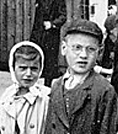 |

|
Transcript
"I
was definitely a good deed as far as my foster
mother was concerned, taking me in; she would
boast about it at the church, show me off, "This
is my little Czech refugee". "Yes, her
mother will be coming over", this kind of
thing. I was sort of on display in that way. They
were people… they were really the tail end
of the Victorian era; they were people who had
been brought up in exceptionally strict homes,
where sin loomed large, and sin loomed large in
the home that they brought up their three children
and me. They were people who did not enjoy children,
or rather they enjoyed boasting about their children
but not actually bringing them up; they always
had nannies and maids. In fact my foster mother
I'm afraid was a quite appalling person. They
knew I was a refugee at school. I loathed pity,
you know, the way people would talk about me,
"Poor thing, we don't know where her parents
are", this kind of thing. I loathed it. I
detested the whole business of being a refugee.
But as far as my own age group was concerned,
they were quite… I mean they were neutral,
they treated me like another friend. In fact I
was, if anybody was, domineering I was. You know
how children, particularly at a nasty age like
sort of ten and eleven, tend to be quite nasty
to each other. Nobody was nasty to me; if anybody
was nasty I was. I can't ever say I was badly
treated at school."
|
 |
 |
 |